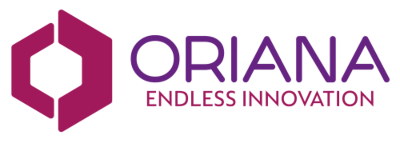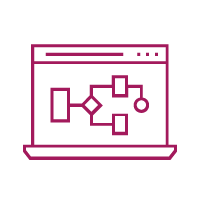As the Greek philosopher, Plato observed, “Necessity is the mother of invention,” and during the pandemic is the time for creative thinking about how to keep on going, and even innovate. Many things that were ‘normal’ are now inaccessible, and business models are turned upside down. So what can a low-code platform such as Oriana’s Low-Code Platform bring to the changing world we find ourselves in? Let’s look at four areas where low-code can offer positive benefits: Health, Community, Arts, and Business, and how low code’s advantages of speed to value represent a real moment for low-code use-cases in helping with digital urgency.
Health
Supply chains are severely disrupted and the demand for essential hospital supplies and goods is crucial. That’s a perfect use-case for workflow facilitation, which can be easily created using a low-code platform.
And if someone does suspect that they have covid-19, apps are being developed to assist in learning about the virus, and to gather test results and daily statistics. Monitoring cases, prioritizing, and tracking can all be described as typical workflow operations. In the very recent past, these might have been done by individual doctors on a case-by-case basis, with very little ‘joined-up thinking’. With the rapid adoption of low-code solutions to the statistical and data management of the health crisis, significant advantages can be gained in meeting current challenges.
Low-code is enabling the fast-track development of apps to help those in the most vulnerable groups of society, such as the elderly and people with chronic diseases, to access medicines and care. And at a time when psychological support is becoming ever more necessary – particularly for ‘frontline’ medical workers – there are now low-code developed apps for free psychological advice from, and to, professionals.
Community
Turning to Community responses to the pandemic, there are many heart-warming stories of volunteers stepping up to bring food and comfort to the frail and sick. Social media often provides a platform for organizing these activities, and now mobile apps are being developed to aid essential goods delivery by volunteers. In some cases this involves simple re-purposing of existing delivery and ordering apps from goods delivery companies.
There are numerous ways in which people search for help, often through community portals being developed to offer assistance. In many communities, people have become jobless and are now searching for ways to survive and go forward. Not every Help Portal will have been set up using low-code, but the time-saving and ease of use of low-code lends itself to the creation of these, and other community-oriented applications.
The Arts
There are inspiring examples of artists and performers rising to the creative challenge of being unable to work on stage and screen. Some of them ingeniously re-purpose existing technologies to give – for example – virtual concerts. While it’s true that listening to a 40-piece orchestra may always be better in an actual concert hall, the virtual version is better than nothing. Artists and performers are learning digital lessons fast.
As few of these people and organizations are by nature programmers, the appeal of any process which is open to the non-programmer is highly attractive. Digital marketplaces, where work can be shown and bought have been around for a few years now, but the pressures of the pandemic mean that new apps will also assist artists in the search for support and sponsorship. As with other developments derived from ‘the mother of necessity’, these innovations seem to be exactly the right thing, at exactly the right time. Much of this is enabled by the power of low-code solutions, and the skills of hands-on Citizen Developers.
Business
In pre-crisis blogs, we often focused on the needs of SMEs, and larger business organizations, showing how low-code solutions can help digital transformation. This focus has not changed, and the benefits of low-code to enterprises remain clear.
Currently, small and medium businesses are suffering, and to help support them, Oriana is offering free end-user licenses to European SMEs for applications built on Oriana’s Low-Code Platform, through to the end of 2020. This way the pathway to improved digital processes is still accessible, at a time when the need for digital transformation and enhancement has never been greater.
However, we’re also looking at how low-code can help other vital areas, such as Food & Provision Management – it’s basically a workflow after all – with delivery to restaurants, other small businesses, and citizens. Then there’s an app development on the way for local businesses that may not have any website or e-commerce presence at all, allowing them to advertise their services. ‘Business’ is not just corporations in fancy offices – it’s also about street-level, day-in, day-out survival mode for vast numbers of small shops and enterprises.
Necessity and invention
The fallout from covid-19 for communities, businesses, and individuals may be long-lasting. However, we can get smarter, and deploy all the tools we have to face the challenges. In the area of low-code, that means getting applications up and running swiftly and smoothly, to help people in every walk of life. Oriana has the platform to help make necessity the mother of invention.



